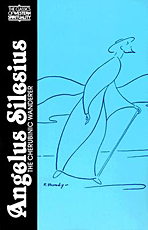Angelus Silesius (1624-1677) was a Lutheran doctor of philosophy who became court physician in Poland. He converted to Catholicism in 1653 and in 1661 was ordained as a priest. Silesius mastered the seventeenth century literary form of the epigram and used it to proclaim the mystical dimensions of Christianity. In many cases, his brief but poignant poems are as startling as the visionary poems of Rumi and Hafez. There is no one in Christendom who is able to match his terse meditations on divinization. Now more than ever, we need to ponder the meanings of these gems.
Maria Shrady translated the poems in this volume in The Classics of Western Spirituality series from Paulist Press. In her foreword, she marvels at Silesius's emphasis upon the unity of the soul with the Godhead, the paradoxes inherent in faith and life on earth, the inwardness that is part of the spiritual journey, the importance of silence, and the joy that is the prize of faith. She concludes:
"Throughout all his speculations, he never loses sight of his final goal which is divinization. The term, which to many has proved a stumbling block, is classic with the Greek Fathers, particularly with Athanasius: 'The Son of God became son of man'; so he writes, 'so that the sons of man, that is of Adam, might become Sons of God. Thus he is Son of God by nature, and we by grace.' And Cyril of Alexandria sums up: 'We are made partakers of divine nature and are said to be sons of God, nay we are actually called divine, not only because we are exalted by grace to supernatural glory, but also because we have God dwelling within us' (in John1)' This is the orbit in which Silesius moved, marked out by the ideas of participation in the divine nature (the purity of which he never tired of exalting), rebirth through the Spirit, adoption as Sons — all concepts leading to deification and expressed with depth and boldness and sublime inwardness."
Here is a sampler of epigrams:
The Rose
The rose which here on earth is now perceived by me,
Has blossomed thus in God from all eternity.
To Me It's All the Same
I wonder what to do! To me it's all the same:
Place, no-place, eternity, night, day, and joy and pain.
The Sweetest Revelry
Oh, the sweetest revelry! God has become my wine,
Meat, table, serving man, my music when I dine.
The Silent Prayer
God far exceeds all words that we can here express.
In silence He is heard, in silence worshipped best.
God's Dwelling
My body, marvelous! God's dwelling has become;
So high in His esteem that equal it has none.
